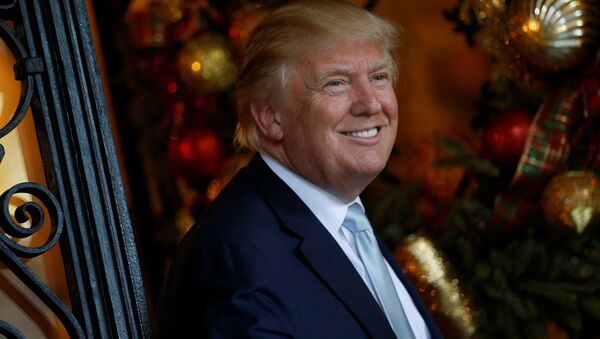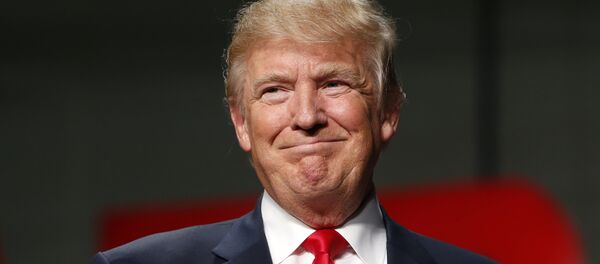Trump also must deal with security-related issues exacerbated by the Obama administration, including confrontations in the South China Sea.
THE ‘ONE CHINA’ POLICY CONTROVERSY
A controversy erupted in early December after Trump had a phone conversation with Taiwan’s President Tsai Ing-wen followed by negative comments about the venerable, 44-year-old US "one China" policy that has been in place since 1972, which recognizes Beijing as the only legitimate government.
"I don't know why we have to be bound by the ‘one China’ policy unless we make a deal with China having to do with other things, including trade," Trump said in an interview with FOX News on December 11.
When asked about Beijing protesting his conversation with the Taiwanese president, Trump said he did not want China "dictating" to him.
These comments on the "one China" policy and the US-Taiwanese relationship have prompted deep concerns among Chinese observers that overshadow Trump’s positive overtures.
Trump had previously taken several major steps that signaled a much more accommodating and cooperative approach to Beijing offset by his remarks vis-a-vis Taiwan’s status.
On December 7, for example, Trump announced his appointment of veteran Iowa Governor Terry Branstad to be the US Ambassador to China. Branstad is a long-time friend of Chinese President Xi Jinping and his appointment suggests a desire to establish stable relations between the two countries.
Beijing also warmly welcomed Trump’s commitment to pull the United States out of the controversial, 12-nation Trans Pacific Partnership (TPP) as soon as he took office.
A POSSIBLE ECONOMIC COLLISION COURSE
Trump said he will attempt to extract a number of economic concessions from China during his presidency related to the trade deficit and currency valuation, although the United States might not be in a position to be so demanding.
Russian analyst Dmitri Mikheyev told Sputnik in an interview that Trump wants China to make significant economic concessions with respect to the United States that Beijing is unlikely to agree with.
"Trump does not want to start a war of tariffs because it will be a tremendous crisis for the world economy," Mikheyev argued. "He seeks instead to force China to increase the yuan exchange rate and take other steps."
While Trump wants to avoid a full-fledged economic confrontation, Mikheyev added, he is looking to find an instrument to pressure Beijing into accepting his demands.
"But China is already so powerful that it can destroy the US financial system," Mikheyev claimed.
Trump is also now a hostage to his repeated rhetoric during the election campaign about drastically reducing the annual trade deficit with China. That could enrage Beijing and endanger China’s internal stability if it panics the Shanghai financial markets.
China’s export-driven industries will also be vulnerable to any sharp downturn in exports to the United States — by far the largest single market for its goods.
"During his election campaign, Trump pointed his finger at China, which he said is the cause of what is now happening in America, which has been hit by de-industrialization," Mikheyev told Sputnik. "While the American middle class becomes impoverished, high-tech industry moves away to China."
Now that the United States and China are in a war of words over Taiwan, it should be perceived in the context of the economic impoverishment of the US middle class, which remains a huge problem, Mikheyev warned.
In terms of economic growth, Trump pulling the United States out of TPP actually bolsters China. It clears the way for Beijing to push ahead with its Regional Comprehensive Economic Partnership (RCEP) project that it has been working on since 2011 with trade negotiators from 14 other Asian nations, including Japan and India as well as Australia.
If concluded, the RCEP will cover almost 30 percent of global GDP and more than 25 percent of world trade and might be the potential base for an even larger, China-led Asia-Pacific free trade area excluding the United States.
POTENTIAL US-CHINA SECURITY TENSIONS
Adding to Trump’s difficulties in dealing with Beijing are the powerful forces that have been driving China and the United States into direct confrontation.
Republicans and neoconservative hawks as well as liberal champions of international law alike oppose China’s efforts to claim rights over 95 percent of the South China Sea.
President Barack Obama has deployed major naval and air forces in the region that routinely operate at the very fringes of China’s acknowledged territorial waters, increasing the risk of dangerous clashes.
Beijing hopes the United States will keep its promise to not take sides, allowing regional partners "to maintain peace and stability," according to Chinese Foreign Minister Geng Shuang.
Regardless of how China develops its regional bases, the United States "will not allow a shared domain to be closed down unilaterally," Admiral Harry Harris, head of US Pacific Command said during a recent speech in Sydney.
The new Chinese fortifications feature anti-aircraft guns thought to be a defense against cruise missiles, while China insists they are minimum defensive requirements, not part of a scheme to project power.
In October, the US sent a warship through the South China Sea, the fourth operation of its kind calling it a "freedom of navigation" patrol near the land reclamation projects.
China retaliated by flying a nuclear bomber over the South China Sea, presumably a demonstration of its military prowess toward the new US President who will be sworn in next month.
However, conversely, Trump has repeatedly said he wants to avoid conflicts around the world in order to rebuild the exhausted US military forces and to concentrate on his priority strategic goal of destroying the Islamic State.
In addition, Trump’s choice of Exxon Mobil Chairman and CEO Rex Tillerson as his secretary of state sends a message that he puts economic interests above ideological ones and suggests that he would therefore like to reduce the level of confrontation with Beijing over the South China Sea.
Moreover, the United States has high hopes to continue collaborating with China and others in the region, as $5 trillion worth of goods transit the maritime area annually.
Overall, Trump will be constrained by political, military and economic issues in handling his ongoing relationship with Beijing.




